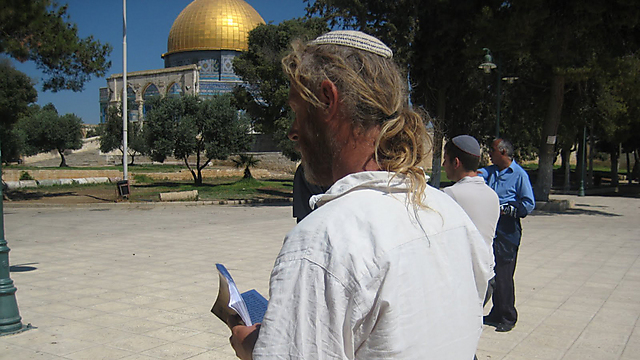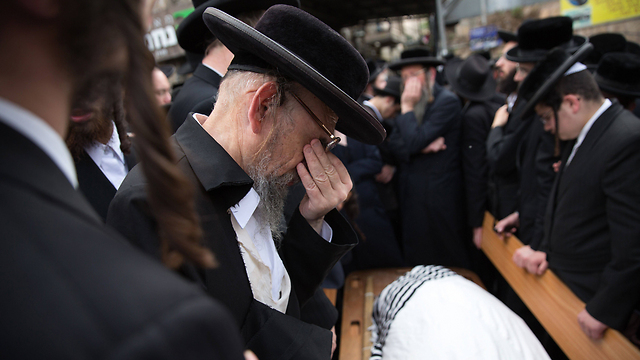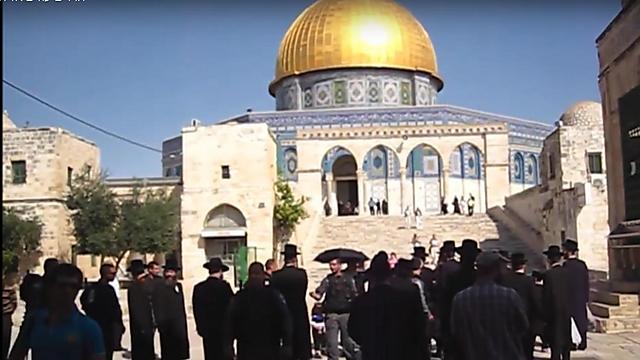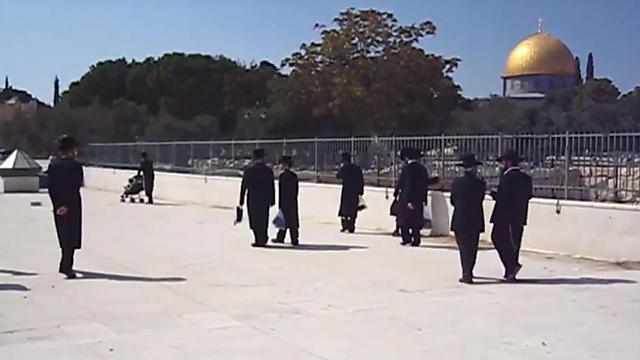
The haredi battle over the Temple Mount: A growing dilemma
Israel's ultra-Orthodox public, which is paying a heavy price in the latest wave of terror, is torn between the strict halachic ban on visiting the holy site and the national desire to strengthen Jewish presence in the area.
Since 1967, when the Old City was captured along with the Temple Mount, this halachic-theoretic issue has turned into an explosive dispute between ultra-Orthodox and religious Jews, and among the religious sector itself.
In the current battle, in which the haredi public is paying a heavy bloody price, it is torn between the unequivocal halachic ban on visiting the Temple Mount and a national desire to strengthen the Jewish presence in the area.
During the funeral of Rabbi Yeshayahu Krishevsky, who was murdered Tuesday in a terror attack on Jerusalem's Malchei Yisrael Street, members of the Jewish extreme Sicarii group handed out leaflets claiming that the Jews visiting the Temple Mount are responsible for the recent wave of terror, as they are "provoking the Arabs."

The more moderate funeral participants mourners exercised restraint and avoided referring to the political and diplomatic circumstances of Krishevsky's murder. One of the participants, Rabbi Elimelech Biderman, said: "God Almighty wants to encourage us to repent. We are all his children.
"Rabbi Yeshayahu Krishevsky wasn't taken away from us as a private person, but as part of all of us, so this incident speaks to everyone. We must get closer to God by praying and improving our acts. Every person already knows what he has to repair in himself."
'The terrorists are just the snake'
Another funeral participant added, "We are against going up to the Temple Mount of course. It's halachically forbidden and endangers all of us, but the attack clearly did not happen because of that. It's just an excuse. We have to repent. It's not the snake that kills, it's the sin that kills. The terrorists here are just the snake."

So is it halachically permitted to visit the Temple Mount?
The clear answer on the haredi street is that it is absolutely forbidden. According to the Halacha, an impure person must not visit the Mount due to its sacredness. During the Temple era, every person could be purified in ceremonies before the visit, but today it's impossible. Therefore, the strict approach explains, there is a complete ban on visits. The punishment is death at God's hands.
But a fundamental change is taking place on the haredi street itself, and groups of ultra-Orthodox Jews visiting the Temple Mount are no longer a rare sight, angering the sector's leaders.
So how do religious rabbis permit the visits? They rely on historic-archaeological studies on the exact location of the mountain, and ban the entrance to that area only. The rest of the compound can be visited after immersing in a ritual bath.
Jerusalem Councilman Yitzhak Pindrus of the Degel Hatorah faction, who was close to Rabbi Yosef Shalom Elyashiv, says that the opinion of the late leader of the Lithuanian-haredi community on visiting the Temple Mount was "crystal clear, just like his opinion on desecrating Shabbat: It is forbidden to enter the area of the mountain.
"The borders of the mountain according to the Halacha are unclear - and even if they are clear to anyone, they can easily be crossed. Not to mention the fact that according to the Halacha, the Temple Mount's borders are determined by tradition, so any kind of knowledge has no halachic significance, and not to mention the fact that those who don’t care about the halachic issue will sin."
Consensus? Only on the haredi street
Pindrus notes that the Steipler (Rabbi Yaakov Yisrael Kanievsky, one of the leaders of the haredi public during the Six-Day War) was about to issue a letter on the matter after Israel gained control of the Temple Mount, "but then the Chief Rabbinate issued the order signed by the chief rabbis at the time, and there was no need for it. There was wall-to-wall consensus."
Those in favor of visiting the Temple Mount, mainly members of the Religious Zionism movement, will firmly oppose the halachic consensus which Pindrus and his friends are insisting on presenting today. In 1967, however, the Chief Rabbinate was dominated by the opinions of the haredi "outstanding rabbis of the generation," and was incapable of disagreeing with them - especially on such issues.
With the absence of an acceptable ruling, there was no awareness in those days of the fact that there are some areas which one can visit after immersing in a ritual bath. The halachic discourse on visiting the mountain after the "purification" began only several years ago. So after Jerusalem's liberation one could either visit every part of the mountain, without immersing in a ritual bath - or avoid visiting the area completely. Most rabbis at the time relied on the latter opinion.
Today, those who permit Temple Mount visits rely on a long list of senior rabbis in the sector - starting from Rabbi Haim Druckman to Rabbis Dov Lior and Eliezer Melamed - who halachically permit Jews to visit defined areas on the Temple Mount after immersing in a ritual bath. In addition, there a common argument that it is a mitzvah to increase the Jewish presence on the Temple Mount in order to strengthen the Jewish sovereignty in the Land of Israel.
On the other hand, there are senior officials in the Religious Zionism movement who oppose Temple Mount visits, such as late Rabbis Mordechai Eliyahu and Avraham Shapira.
The 'sin' and its 'punishment'
Haredi politicians won’t budge from the opinion of the Torah sages. "The official haredi stance completely forbids visits to the Temple Mount, so these days it is halachically a serious act, which endangers the people and the state," said a source in the United Torah Judaism party.

"Alongside the halachic ban, we see that the desire of different groups to visit the Temple Mount does not come from a real need to pray in a holy site," added a senior sources in the faction, "but is nothing more than a political and nationalistic issue, which seeks to prove control of the area. Therefore, it is a dangerous act of unnecessarily provoking the world's nations."
On the other hand, one cannot ignore the fact that images of haredim inside the Temple Mount compound have been distributed on social media in the past two years.
According to Pindrus and many others in the haredi society, this deviation from the official conservative line has one explanation: "One can buy a hat and a suit in many stores, and declaring that you are haredi doesn’t require any formal procedure. But the haredi stance is clear."
Even if the haredi leadership is still hesitant about publicly lashing out at those who visit the mountain these days, on the haredi street there are those who have already spoken. The recent flare-up led Elhanan Buzaglo, a Sephardic haredi activist, to film a controversial protest video at the entrance to the Temple Mount. The harsh statements made by his friend, Kobi Lahiani, on the video have already sparked a fiery debate on the Web, where the clip has gone viral.
Haredim visit the Temple Mount too
"One has to listen to 90 minutes of eulogies about the victim of the vehicular attack, Rabbi Yeshayahu Krishevsky, to understand. The prevailing opinion is that the terrorists were just a tool. It's not a security-related issue, but a sign that we have to wake up. The haredi public sees the visits to the Temple Mount as the sin requiring correctionir."
Distributing ads in Arabic
Shmuel Pappenheim of the Toldot Aharon Hasidic movement, a former spokesperson for the extreme Eda Haredit organization, has even harsher things to say.
"Two weeks ago, there was an unequivocal announcement on behalf of the Badatz (the Eda Haredit's "court of righteous law") about gathering and visiting the Temple Mount," he says. "It’s nothing new. The Eda Haredit has been warning about it for years."
On the other hand, you see pictures of haredim going up to the mountain.
"There are Belz Hasidim who visit the mountain. I am very surprised that their leadership allows it. It's a shame that this is not being taken care of and stopped. It's a kareth prohibition (a prohibition which carries a divine punishment by untimely death or eternal excommunication)."
The Belz movement clarified that the rebbe had issued a order not to visit the Temple Mount under any circumstances.
"The Eda Haredit appointed a supervisor who would stand at opposite the slope at the Mughrabi Gate at the time in order to warn people that they must not visit the mountain. Chabad follower Moshe Weber wrote a book about it. The second intifada broke out because of Ariel Sharon, and it’s the same reason today."

Pappenheim says he singlehandedly prevented the organization of a protest delegation of haredi rabbis from the anti-Zionist Eda Haredit against the Temple Mount Faithful movement.
"I stopped it because I thought it would be perceived as part of the Eda Haredit's anti-Zionist outlook, and that people won’t understand that it really is a halachic matter. Now I am regretting the fact that we kept silent.
"I received an order yesterday to publish the ad issued by the current chairman of the Badatz court, Rabbi Sternbuch, against visits to the Temple Mount - in English and in Arabic too - and to distribute it on the Arab media. We would like to take a group with signs to stand and protest, but we're not sure the police will approve such a thing right now."
'No one is God's secretary'
There is, however, a dissonance between the haredi stance which strictly opposes visiting the Temple Mount and the issue of Jewish presence in the Old City and on the roads leading to the Western Wall.
While rabbis like the Ger rebbe forbade their followers to visit the Western Wall and the Temple Mount, others are all for it. For example, Rabbi Shalom Cohen, head of the Council of Torah Sages, who serves as head of the Porat Yosef Yeshiva, which is located near the Western Wall plaza.
Only this week, however, Rabbi Cohen referred to those visiting the Temple Mount as "crazy," but firmly refused to link between the visits to the mountain and the recent attacks.
According to Rabbi Moshe Shaffir, editor of the Shas journal Yom Leyom, "Rabbi Shalom announced that studying Torah will defend the students asked to show up to the yeshiva as usual. The great sages of Israel believe that our situation will improve as Torah studies in the yeshivot grow stronger.
"As for the Temple Mount," he says, "the stance is absolutely clear: We accept Maimonides' words that it is forbidden to enter the Temple Mount. That was Rabbi Ovadia Yosef's opinion. He warned against it several times. There was hardly anyone who violated it until the past five years, not even in the Religious Zionism movement.
"It’s true that there are those who have winds of courage surging within them, and it's hard for them to accept the insult that we don't visit the site. But that's the Torah's opinion, and God wouldn't want us to enter in our impurity. It's our dignity, although some people think differently. Who are they anyway?"
Rabbi Shaffir refuses to accept the extremists' version which links between the terror attacks and the visits to the mountain. "No one is God's secretary, and there is no prophecy in our times. But we know that God doesn’t like it, and it carries a serious punishment.
"But saying that's it's the reason? I haven't heard any rabbi say so. When Baron Rothschild entered the Temple Mount, Rabbi Kook wrote a harsh letter against it. The haredi stance remains loyal to the pledge not to advance redemption through force. We hope to receive everything on a gold platter, without having to enter the site like thieves in the night."











